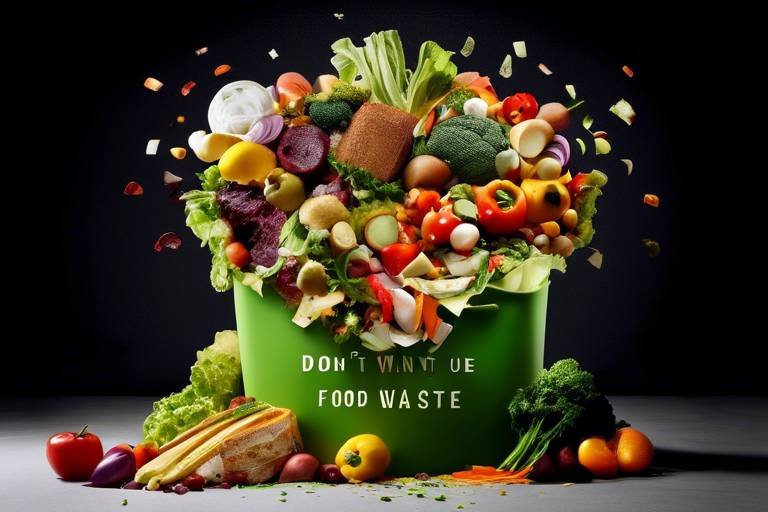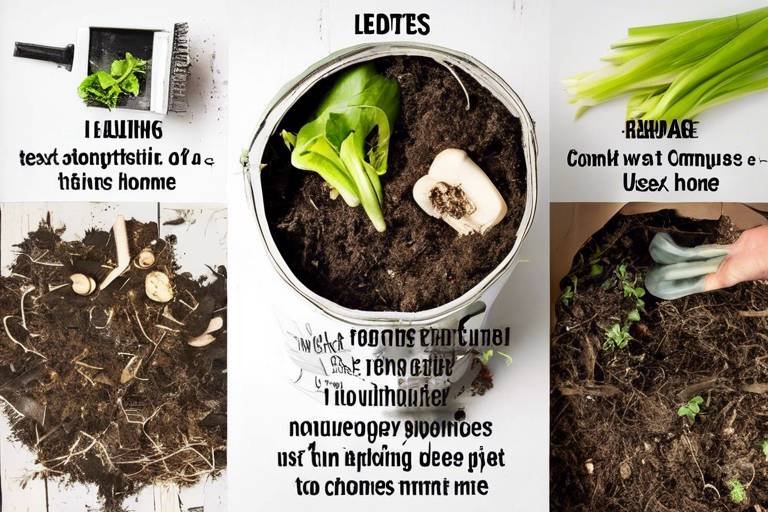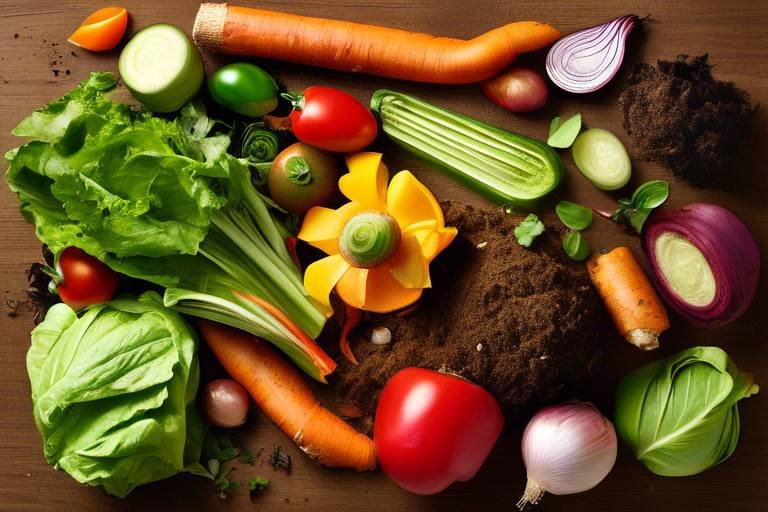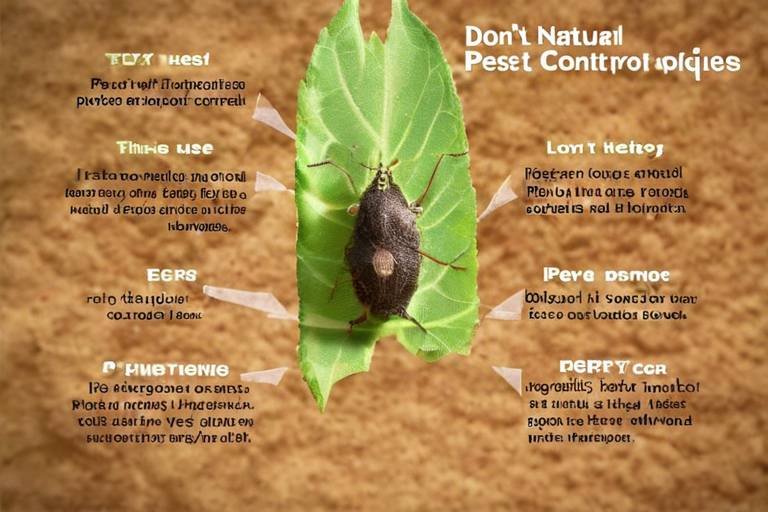How to Encourage Your Friends to Live More Sustainably?
In today's world, where environmental concerns are at an all-time high, encouraging your friends to adopt more sustainable practices can feel like both a challenge and a responsibility. But how do you motivate those around you to embrace a lifestyle that benefits not just them, but the planet as a whole? The journey to sustainability is not just about individual actions; it’s about creating a ripple effect that inspires others. In this article, we'll explore effective strategies that you can use to motivate your friends to live more sustainably, fostering a collective commitment to environmental responsibility.
Sustainability is not just a buzzword; it’s a crucial concept that refers to meeting our own needs without compromising the ability of future generations to meet theirs. The importance of sustainability cannot be overstated—it encompasses everything from reducing waste to conserving natural resources, and each small action contributes to larger environmental goals. By understanding how individual actions can lead to significant change, you can better motivate your friends to join the cause. Think of sustainability as a massive web, where each thread represents a person's efforts, and together they create a strong fabric of environmental stewardship.
One of the most powerful ways to inspire your friends is to lead by example. When they see you actively making choices that support sustainability, they are more likely to follow suit. You don’t have to be perfect; just showing that you care and are making an effort can create a ripple effect. For instance, if you start using reusable shopping bags or composting, share your experiences with your friends. Talk about the challenges you faced and how rewarding it feels to make a positive impact. Your authenticity can resonate deeply and encourage them to adopt similar habits.
Integrating eco-friendly habits into your daily routine is easier than you might think, and it can be fun! Here are some simple habits that you can adopt and share with your friends:
- Reducing Single-Use Plastics: The impact of single-use plastics is staggering. By switching to reusable containers, straws, and utensils, you can significantly reduce your plastic footprint. Encourage your friends to join you in this effort by sharing alternatives, such as beeswax wraps instead of plastic wrap.
- Choosing Sustainable Products: When shopping, opt for products made from sustainable materials. This can include everything from clothing to household items. Share your favorite brands with your friends and explain why these choices matter.
Why not make sustainability a fun group effort? Organizing activities like community clean-ups or plant-based cooking nights can be a great way to engage your friends. These activities not only promote sustainable practices but also strengthen your bond as a group. Imagine the joy of working together to clean up a local park or sharing delicious plant-based meals. It’s about creating memorable experiences while making a difference!
Knowledge is power, and providing your friends with educational resources can help them understand the importance of sustainability. Share books, documentaries, and websites that delve into environmental issues and sustainable practices. For instance, documentaries like “Our Planet” or books like “The Omnivore's Dilemma” can open their eyes to the impact of their choices.
In the digital age, sharing informative articles and engaging videos is easier than ever. Use social media platforms to highlight content that emphasizes the importance of sustainable living. You might be surprised at how a compelling video can spark interest and conversation among your friends!
Consider hosting informal gatherings where you and your friends can discuss sustainability topics. This creates a supportive environment for sharing ideas and learning from each other. You could even invite a guest speaker or watch a documentary together to kickstart the conversation. The more you talk about it, the more likely it is to stick!
Building a network of like-minded individuals can significantly enhance your sustainability journey. When you surround yourself with people who share your values, it creates a sense of accountability and encouragement. Encourage your friends to join local environmental groups where they can find resources and support. This not only helps them stay motivated but also fosters a sense of community.
Social media can be a powerful tool for sharing sustainable practices. Create a group or page where you and your friends can post tips, successes, and challenges. This not only keeps everyone engaged but also inspires others outside your immediate circle to join the movement.
Recognizing and celebrating small achievements in sustainable living is crucial. Whether it’s reducing waste or choosing eco-friendly products, these victories should be acknowledged. You could even set up a monthly gathering to share successes and set new goals together. This fosters a sense of camaraderie and shared purpose in your eco-friendly endeavors.
Encouraging your friends to set achievable sustainability goals together can create a sense of unity. Whether it’s committing to a zero-waste challenge for a month or pledging to use public transport more often, having shared goals can motivate everyone to stay on track.
Highlighting and sharing success stories within your friend group can be incredibly motivating. When one person achieves a goal, it can inspire others to take action. Celebrate these moments and remind each other of the positive impact you’re making as a group.
Q: How can I start small in my sustainability journey?
A: Start by making small changes, like using reusable bags or reducing single-use plastics. Every little bit counts!
Q: What are some good resources for learning about sustainability?
A: Look for documentaries, books, and reputable websites that focus on environmental issues. Sharing these with friends can spark interest.
Q: How can I keep my friends motivated?
A: Celebrate small wins together, set goals, and create a supportive community where everyone feels accountable.

Understanding Sustainability
Sustainability is more than just a buzzword; it’s a vital concept that encompasses how we live, work, and interact with our environment. At its core, sustainability refers to the ability to meet our current needs without compromising the ability of future generations to meet theirs. This idea is crucial in an age where our resources are depleting at an alarming rate. Think of it as a balancing act, where we strive to maintain equilibrium between ecological, social, and economic systems. By understanding sustainability, we can appreciate how our individual actions contribute to larger environmental goals.
Every time you choose to recycle a plastic bottle or opt for a reusable shopping bag, you're making a choice that aligns with sustainable practices. These small actions may seem insignificant on their own, but collectively, they can lead to substantial change. For instance, if everyone in your community decided to reduce their water usage by just a few gallons a day, the cumulative effect could result in saving millions of gallons over time. It’s like planting seeds: each small action nurtures the growth of a healthier planet.
Moreover, sustainability isn't just limited to environmental concerns. It also encompasses social equity and economic viability. It's about creating a world where everyone has access to resources, opportunities, and a clean environment. When we talk about sustainability, we often think about three pillars: environmental protection, social equity, and economic development. Together, these pillars form the foundation of a sustainable society.
To illustrate the importance of sustainability, consider the following table that highlights the impact of individual actions on the environment:
| Action | Environmental Impact |
|---|---|
| Reducing Meat Consumption | Lower greenhouse gas emissions and reduced water usage. |
| Using Public Transportation | Decreased air pollution and reduced carbon footprint. |
| Recycling | Conservation of natural resources and reduced landfill waste. |
| Choosing Renewable Energy | Reduction in reliance on fossil fuels and lower carbon emissions. |
Understanding sustainability empowers us to take action. It encourages us to think critically about our choices and their consequences. By embracing a sustainable lifestyle, we not only enhance our own well-being but also contribute positively to the planet. So, let’s embark on this journey together, encouraging our friends and communities to join in making choices that promote sustainability. After all, every little bit counts, and together, we can create a more sustainable future!

Lead by Example
When it comes to encouraging your friends to embrace sustainability, one of the most powerful tools at your disposal is leading by example. Your actions speak louder than words, and by adopting eco-friendly habits in your daily life, you can create a ripple effect that inspires those around you. Imagine this: every time you choose to cycle instead of drive, or bring your reusable bag to the store, you're not just making a personal choice; you're showing your friends that living sustainably is not only possible but also rewarding. It's like planting a seed of environmental consciousness that can grow in the minds of those you care about.
So, how can you effectively model sustainable behaviors? Start with small, manageable changes that you can easily integrate into your routine. For instance, consider reducing your single-use plastics. This might mean carrying a reusable water bottle instead of buying bottled water or opting for bulk items instead of individually packaged ones. When your friends see you making these choices, they may feel inspired to follow suit. You could even create a fun challenge among your group, like seeing who can go the longest without using plastic straws or bags.
Another impactful way to lead by example is by choosing sustainable products. Whether it’s eco-friendly cleaning supplies, organic foods, or ethically sourced clothing, sharing your recommendations can influence your friends' purchasing decisions. You might say something like, “I just switched to this brand of biodegradable laundry detergent, and it works wonders!” This kind of casual sharing not only informs your friends but also builds a sense of community around sustainable choices.
But leading by example doesn't stop at individual habits; it can extend to organizing group activities that focus on sustainability. Why not plan a community clean-up day or a plant-based cooking night? These events can be a fun way to engage your friends while also making a positive impact on the environment. Plus, when you work together towards a common goal, you foster a deeper sense of camaraderie and commitment to sustainable living.
In summary, leading by example is one of the most effective ways to encourage your friends to adopt sustainable practices. By making conscious choices in your own life and sharing those experiences, you can inspire a collective commitment to environmental responsibility. Remember, every small action counts, and together, you and your friends can create a positive impact on the planet.
- What are some easy eco-friendly habits I can adopt? Start with simple changes like using reusable bags, reducing water waste, and avoiding single-use plastics.
- How can I encourage my friends to join me in sustainable practices? Lead by example through your own habits, organize group activities, and share informative resources that highlight the benefits of sustainability.
- Why is it important to lead by example? Leading by example creates a powerful ripple effect, inspiring others to make sustainable choices and fostering a supportive community.

Adopting Eco-Friendly Habits
When it comes to living sustainably, adopting eco-friendly habits is a game changer. It’s like planting seeds in a garden; the more you nurture them, the more they grow. You might be wondering, “Where do I even start?” Well, fear not! Making small changes in your daily routine can lead to a significant impact on the environment. Think of it as a ripple effect—your actions can inspire others to jump on the sustainability bandwagon.
First off, let’s talk about the power of conscious consumption. This means being mindful of what you buy and how it affects the planet. For instance, when you go shopping, you can choose products with minimal packaging or those made from recycled materials. It’s all about making choices that reflect your commitment to the environment. Have you ever thought about how many plastic bags you use in a week? By switching to reusable bags, you not only reduce waste but also set a precedent for your friends. They’ll see your eco-friendly habits and might just follow suit!
Another simple yet effective habit is reducing water usage. This can be as easy as turning off the tap while brushing your teeth or taking shorter showers. You could challenge your friends to a "water-saving week" where everyone tracks their usage. Who knows? They might surprise themselves with how much water they can save! It’s all about creating awareness and fostering a sense of competition—everyone loves a little challenge, right?
Moreover, consider adopting a plant-based diet or at least incorporating more plant-based meals into your routine. This doesn’t mean you have to go full vegan overnight; even one meatless day a week can make a difference. You can host a dinner party featuring delicious plant-based dishes and invite your friends over to try them. This way, you’re not just changing your habits; you’re also introducing your friends to new culinary experiences that are good for the planet.
Lastly, let’s not forget about the importance of composting. It’s like giving your kitchen scraps a second life! By composting, you can significantly reduce the amount of waste that ends up in landfills. You could start a compost bin in your backyard and invite your friends to contribute. This can turn into a fun community project, and you’ll all reap the benefits of nutrient-rich soil for your gardens.
In summary, adopting eco-friendly habits is all about making small, manageable changes that can lead to a larger impact. By leading by example and engaging your friends in these practices, you create a supportive environment that fosters sustainability. Remember, every little bit counts, and together, you can make a significant difference!
- What are some easy eco-friendly habits to start with?
Start with simple changes like using reusable bags, reducing water usage, and composting kitchen scraps. - How can I encourage my friends to adopt these habits?
Lead by example, invite them to participate in activities, and share resources that highlight the importance of sustainability. - Is it really possible to make a difference with small changes?
Absolutely! Small changes can lead to significant impacts when adopted collectively.

Reducing Single-Use Plastics
In today's world, single-use plastics have become a ubiquitous part of our daily lives, but their impact on the environment is nothing short of catastrophic. These items, designed to be used once and discarded, contribute significantly to pollution, harming wildlife and ecosystems. As we strive to encourage our friends to live more sustainably, one of the most effective strategies is to reduce the reliance on single-use plastics. So, how can we make a difference together?
First and foremost, it's essential to understand the scale of the problem. According to recent studies, millions of tons of plastic waste end up in our oceans each year, choking marine life and disrupting food chains. By making conscious choices, we can collectively reduce this staggering statistic. One practical way to start is by swapping out single-use items for reusable alternatives. For instance, instead of reaching for a plastic water bottle, encourage your friends to invest in a stylish reusable one. Not only does this help the planet, but it can also save money in the long run!
Here are some common single-use plastics that we can replace:
- Plastic straws - Opt for reusable metal or bamboo straws.
- Plastic shopping bags - Use sturdy cloth bags instead.
- Disposable cutlery and plates - Choose biodegradable options or bring your own from home.
Additionally, when you’re out shopping, it’s a great idea to support businesses that prioritize sustainability. Many stores now offer products with minimal or no plastic packaging. By sharing these experiences with your friends, you not only encourage them to make similar choices but also create a ripple effect in your community. You might even organize a shopping trip together to explore local stores that focus on eco-friendly practices, making it a fun outing while promoting sustainability.
Another impactful step is to educate your friends about the importance of recycling and proper waste disposal. Many people are unaware that not all plastics are recyclable, and contamination can render entire batches unrecyclable. By sharing resources and tips on how to recycle effectively, you empower your friends to take action. For example, you could create a simple table comparing recyclable and non-recyclable plastics to make it easier for them to understand:
| Type of Plastic | Recyclable? |
|---|---|
| PET (1) | Yes |
| HDPE (2) | Yes |
| PVC (3) | No |
| LDPE (4) | No |
| PP (5) | Yes (in some areas) |
| PS (6) | No |
| Other (7) | No |
By taking these steps, we not only reduce our plastic footprint but also inspire our friends to join us in this vital mission. Remember, every little action counts, and together, we can create a more sustainable future for everyone. So, why not challenge your friends to a plastic-free week? It could be a fun way to engage with each other while making a significant impact!
In conclusion, reducing single-use plastics is a crucial step in fostering sustainability. By leading by example, sharing knowledge, and engaging in community activities, we can motivate our friends to embrace eco-friendly practices. After all, the journey to a sustainable lifestyle is much more enjoyable when we take it together!

Choosing Sustainable Products
When it comes to making a positive impact on the planet, one of the most powerful actions we can take is . But what does that really mean? In essence, it involves selecting items that are designed with the environment in mind, minimizing harm to our planet while maximizing benefits for both consumers and communities. This choice can significantly reduce our carbon footprint and promote ethical practices in manufacturing and sourcing.
Think about it: every time you purchase something, you're casting a vote for the kind of world you want to live in. By opting for sustainable products, you’re supporting companies that prioritize environmental responsibility and social equity. This not only encourages more businesses to adopt sustainable practices but also creates a ripple effect that can lead to larger systemic changes. For instance, when more people demand organic cotton, it pushes the industry towards more sustainable farming methods.
So, how do you go about choosing these products? Here are a few tips to keep in mind:
- Research Brands: Look for companies that are transparent about their sourcing and production processes. Brands that prioritize sustainability often provide information about their materials, labor practices, and environmental impact.
- Check Certifications: Certifications such as Fair Trade, USDA Organic, and Energy Star can help you identify products that meet specific sustainability criteria.
- Support Local: Whenever possible, choose locally sourced products. This not only reduces transportation emissions but also supports your local economy.
Moreover, consider the lifecycle of the products you purchase. Ask yourself questions like: How long will this item last? Is it recyclable or compostable? By being mindful of these factors, you can make choices that have a lasting impact. For example, investing in high-quality, durable goods might seem pricier upfront, but they often save you money in the long run and reduce waste.
To illustrate the importance of these choices, let’s look at a simple comparison of conventional versus sustainable products:
| Aspect | Conventional Products | Sustainable Products |
|---|---|---|
| Material Sourcing | Often derived from non-renewable resources | Utilizes renewable resources and recycled materials |
| Production Practices | May involve harmful chemicals and exploitative labor | Focuses on ethical labor practices and eco-friendly processes |
| Environmental Impact | Higher carbon footprint and waste generation | Lower carbon footprint and encourages recycling |
In conclusion, choosing sustainable products is not just a trend; it’s a lifestyle choice that reflects our values and commitment to the environment. By sharing these insights with your friends, you can inspire them to make informed decisions that benefit not just themselves, but the planet as a whole. Remember, every small change counts, and together, we can create a more sustainable future.
Q: What are sustainable products?
A: Sustainable products are items made with consideration for their environmental impact, often using renewable resources, ethical labor practices, and eco-friendly production methods.
Q: How can I identify sustainable products?
A: Look for certifications (like Fair Trade or USDA Organic), research brands for transparency, and consider the lifecycle of the product, including its materials and durability.
Q: Are sustainable products more expensive?
A: While some sustainable items may have a higher upfront cost, they often save money in the long run due to their durability and lower environmental impact.

Organizing Group Activities
Organizing group activities is not just about having fun; it's a powerful way to foster a sense of community and shared responsibility toward the environment. When you and your friends come together for a common cause, it creates a supportive atmosphere that can inspire everyone to adopt more sustainable practices. Think of it as planting a seed—when you nurture it, it grows into something beautiful. So, what types of activities can you plan to get your friends excited about sustainability?
One of the most engaging ways to encourage sustainable living is through community clean-ups. These events not only help beautify your local environment but also raise awareness about littering and pollution. Imagine the satisfaction of seeing a park transformed from a littered space into a clean, inviting area where families can enjoy nature. Plus, the camaraderie built during these clean-ups can strengthen friendships and make the experience more rewarding.
Another fun idea is to host plant-based cooking nights. Gather your friends for an evening of culinary exploration where you create delicious, sustainable meals together. Not only will you learn new recipes, but you'll also discover the benefits of reducing meat consumption for both your health and the planet. Sharing a meal that you’ve all contributed to can be a bonding experience, and it opens up discussions about food choices and their environmental impact.
If you’re looking for something a bit more adventurous, consider organizing a nature hike or bike ride. This is a great way to appreciate the beauty of the outdoors while discussing the importance of protecting these natural spaces. You can even turn it into a mini-challenge by tracking how many eco-friendly habits everyone can spot along the way—like recycling bins, wildlife, or native plants. This not only makes the activity engaging but also educates everyone about their surroundings.
To make these activities even more impactful, consider creating a calendar of events that includes a variety of sustainable activities throughout the year. This could include everything from workshops on DIY sustainable products to movie nights featuring documentaries about climate change. By keeping sustainability at the forefront of your social gatherings, you’ll create an ongoing dialogue about environmental issues and solutions.
In summary, organizing group activities is a fantastic way to encourage your friends to embrace sustainable living. By creating shared experiences that highlight the importance of environmental responsibility, you can inspire each other to make lasting changes. So gather your friends, plan some fun activities, and watch as you all grow together in your commitment to a more sustainable future!
Q: How can I get my friends interested in sustainability?
A: Start by sharing your own sustainable practices and inviting them to join you in fun, eco-friendly activities. Lead by example!
Q: What are some easy sustainable activities to organize?
A: Consider community clean-ups, plant-based cooking nights, nature hikes, or workshops on sustainable living.
Q: How can I keep my friends motivated to continue sustainable practices?
A: Celebrate small wins together, share success stories, and create a supportive environment where everyone feels accountable.

Educational Resources
When it comes to embracing sustainability, knowledge is power. Understanding the intricacies of environmental issues can significantly enhance your friends' commitment to adopting eco-friendly practices. By sharing educational resources, you can cultivate a deeper awareness of sustainability and its benefits. There are numerous avenues to explore, from books that delve into the science of climate change to documentaries that inspire action. For instance, consider recommending a few impactful titles that resonate with your friends' interests. A great starting point could be:
| Title | Type | Why It's Worth Watching/Reading |
|---|---|---|
| The True Cost | Documentary | This film explores the fashion industry's impact on the environment and human lives, prompting viewers to rethink their consumption habits. |
| Our Planet | Documentary Series | This visually stunning series showcases the beauty of nature while highlighting the urgent need for conservation efforts. |
| Zero Waste Home | Book | A practical guide to living a zero-waste lifestyle, offering tips and tricks that can be easily incorporated into daily life. |
| How to Give Up Plastic | Book | This book provides actionable steps for reducing plastic consumption, making it easier for readers to make a tangible impact. |
Additionally, engaging with online platforms can provide a wealth of knowledge. Websites like WWF and Greenpeace offer articles, research, and tips on sustainable living. Encourage your friends to explore these resources to deepen their understanding of environmental issues.
Another effective way to foster learning is by sharing articles and videos that highlight practical tips for sustainable living. For instance, you could send them a compelling video that showcases innovative recycling techniques or a blog post that discusses the impact of dietary choices on the planet. This not only informs but also sparks conversations around sustainability, making it a shared journey rather than a solitary one.
Consider organizing informal gatherings where you can discuss sustainability topics. These meetups can be casual and fun, allowing everyone to share ideas and learn from each other. You might even incorporate a “sustainability book club” theme, where each month, you focus on a different book or documentary, followed by a discussion session. This creates a supportive environment that encourages everyone to engage with sustainability in a meaningful way.
By providing access to educational resources and creating opportunities for discussion, you can empower your friends to take charge of their sustainability journeys. Remember, the more informed they are, the more likely they are to make conscious choices that contribute positively to the environment.
Q: What are some good documentaries on sustainability?
A: Some excellent options include "The True Cost," "Our Planet," and "Before the Flood." These films provide valuable insights into environmental issues and inspire viewers to take action.
Q: How can I encourage my friends to read more about sustainability?
A: Share interesting articles, recommend books, or even start a book club focused on sustainability topics. Engaging discussions can motivate them to dive deeper into the subject.
Q: Are there online platforms that provide resources on sustainable living?
A: Yes! Websites like WWF, Greenpeace, and various sustainability blogs offer a plethora of information, tips, and guides for living a more eco-friendly life.

Sharing Articles and Videos
In our digital age, the power of information is at our fingertips, and sharing insightful articles and engaging videos can be a game-changer in promoting sustainable living among friends. Imagine sitting down with a cup of coffee, scrolling through your feed, and discovering a captivating documentary that sheds light on the devastating effects of plastic pollution. Wouldn’t you want to share that with your friends? By sharing articles and videos, you not only educate your circle but also spark conversations that can lead to action.
Start by curating a collection of resources that resonate with you. These could range from impactful documentaries that showcase real-life stories of environmental heroes to informative articles that break down complex sustainability topics into digestible pieces. For instance, you might come across a video that illustrates how simple changes in daily habits can significantly reduce carbon footprints. Sharing such content can inspire your friends to think critically about their own lifestyles.
Here are some types of resources to consider sharing:
- Documentaries: Films like "Our Planet" or "Before the Flood" provide visual narratives that can move people emotionally and motivate them to act.
- Articles: Well-researched articles from reputable sources can offer practical tips on sustainable living, such as reducing waste or choosing eco-friendly products.
- How-To Videos: Tutorials on composting, urban gardening, or DIY eco-friendly products can empower friends to take actionable steps.
When you share these resources, consider adding a personal touch. A simple note about why you found a particular article compelling or how a video inspired you can encourage your friends to engage with the content more deeply. You might say something like, "I watched this video about sustainable fashion, and it made me rethink my shopping habits. I think you’d find it interesting too!" This personal connection can make your friends more likely to click on the links and absorb the information.
Additionally, creating a shared digital space, such as a group chat or a social media group, can facilitate ongoing discussions about sustainability. You could set a theme for each week, like "Waste Reduction Week," where everyone shares articles, videos, or personal experiences related to that theme. This not only keeps the conversation alive but also builds a sense of community around your shared commitment to sustainability.
In summary, the act of sharing articles and videos is a powerful tool in encouraging your friends to embrace sustainable living. By curating valuable content, adding personal insights, and fostering discussions, you can create an engaging environment that motivates everyone to take action towards a more sustainable future.
Q1: How can I find good articles and videos about sustainability?
A1: You can explore reputable websites like National Geographic, the World Wildlife Fund, or even platforms like YouTube for documentaries and educational videos. Social media can also be a great source for trending articles and discussions.
Q2: What if my friends are not interested in sustainability?
A2: Start by sharing content that relates to their interests. If they love cooking, share videos on plant-based recipes. The key is to connect sustainability to their passions.
Q3: How often should I share content with my friends?
A3: There’s no set rule! Aim for a balance—enough to keep the conversation going without overwhelming them. Weekly shares or themed discussions can be effective.

Hosting Informative Discussions
One of the most effective ways to encourage your friends to embrace sustainable living is by . Imagine gathering your friends in a cozy setting, perhaps over a cup of coffee or a light meal, where you can openly talk about environmental issues and share insights on sustainable practices. It’s not just about sharing facts; it’s about creating a space where everyone feels comfortable to express their thoughts and learn from one another. The beauty of these discussions lies in their informal nature, allowing for a relaxed atmosphere where ideas can flow freely.
To kick off these discussions, you might want to choose a specific topic related to sustainability. This could range from the impact of climate change, the importance of biodiversity, or even practical steps for reducing waste in daily life. The key is to keep the conversation engaging and interactive. You can start with a few questions to spark dialogue, such as:
- What sustainable practices have you recently adopted?
- How do you feel about the current state of the environment?
- What challenges do you face when trying to live sustainably?
By posing these questions, you not only encourage participation but also create an opportunity for everyone to share their experiences. This can foster a sense of community and mutual support, as friends realize they’re not alone in their sustainability journeys. Additionally, consider inviting a guest speaker or watching a documentary together as a conversation starter. This can provide a fresh perspective and enrich the discussion with expert insights.
Furthermore, it’s helpful to establish some ground rules for these discussions to ensure they remain constructive and respectful. Encourage everyone to listen actively and appreciate diverse viewpoints. This can lead to deeper understanding and even inspire some to take action in their own lives. You could also summarize key points discussed and share resources or articles after the meeting, which can further reinforce the topics covered and keep the conversation going.
In wrapping up the discussion, take a moment to reflect on what was learned and how everyone can implement these insights into their daily lives. This not only reinforces the information shared but also motivates friends to take actionable steps toward sustainability. Remember, the goal is to create an environment where everyone feels empowered to contribute to a healthier planet.
Q: How can I make these discussions more engaging?
A: Incorporate multimedia elements like videos or infographics, and encourage everyone to share personal stories or experiences related to sustainability.
Q: What if my friends are not interested in sustainability?
A: Start with topics that resonate with them personally, such as health benefits of sustainable eating or cost savings from reducing waste. Find common ground to spark interest.
Q: How often should I host these discussions?
A: Aim for a frequency that feels comfortable for you and your friends. Monthly or bi-monthly gatherings can be effective without feeling overwhelming.
Q: Can these discussions be held virtually?
A: Absolutely! Virtual meetings can be just as effective. Use platforms like Zoom or Google Meet to connect with friends who may not be able to gather in person.

Creating a Supportive Community
Building a supportive community around sustainability is like planting a garden; it requires nurturing and care, but the rewards are plentiful. When you surround yourself with like-minded individuals who share a passion for the environment, it not only strengthens your commitment but also creates a network of encouragement and accountability. Imagine a group of friends, each motivated by the same goal of living sustainably, sharing tips, and celebrating victories together. This collective effort can lead to profound changes in behavior and mindset.
One of the best ways to foster this community spirit is by joining local environmental groups. These organizations often host events, provide resources, and offer a platform for individuals to connect. Whether it’s a neighborhood clean-up or a tree-planting event, participating in these activities can help you meet others who are equally passionate about making a difference. Plus, being part of a group can amplify your impact, as you work together to tackle environmental issues.
Furthermore, utilizing social media can play a significant role in creating a supportive community. Platforms like Facebook, Instagram, and Twitter are not just for sharing memes or vacation photos; they can be powerful tools for spreading awareness and connecting with others who are dedicated to sustainability. You can join groups focused on eco-friendly living, follow influencers who promote sustainable practices, and even create your own content to inspire others. Sharing your journey and engaging with a community online can keep you motivated and informed.
To illustrate the benefits of a supportive community, consider the following table that highlights various local environmental groups and their activities:
| Group Name | Activities | Website |
|---|---|---|
| Eco Warriors | Beach clean-ups, tree planting | ecowarriors.org |
| Sustainable Living Collective | Workshops, community gardens | sustainablelivingcollective.org |
| Green City Alliance | Environmental advocacy, clean energy projects | greencityalliance.org |
As you embark on this journey of creating a supportive community, remember that it’s essential to celebrate each other’s progress. When you and your friends share your successes, no matter how small, it reinforces the idea that every effort counts. Whether it’s reducing plastic use or starting a compost bin, acknowledging these achievements can inspire others to take action. Think of it as a ripple effect; your enthusiasm can motivate those around you to join in the movement.
In conclusion, fostering a supportive community around sustainability is not just beneficial; it’s necessary. By joining local groups, engaging on social media, and celebrating achievements together, you create an environment where everyone feels empowered to make a change. So gather your friends, share your experiences, and let’s make a positive impact on our planet together!
Q: How can I find local environmental groups?
A: You can search online for local organizations or check community boards at libraries or coffee shops. Social media platforms also have groups dedicated to sustainability.
Q: What are some easy ways to start living sustainably?
A: Start by reducing single-use plastics, choosing sustainable products, and conserving energy at home. Even small changes can make a difference!
Q: How can I encourage my friends to join me in sustainable practices?
A: Lead by example, share educational resources, and invite them to participate in community events. Making it fun and engaging can spark their interest.

Joining Local Environmental Groups
Joining local environmental groups is a fantastic way to not only deepen your understanding of sustainability but also to engage with a community that shares your passion for the planet. These groups often provide a treasure trove of resources, support, and opportunities to get involved in meaningful projects. Imagine being part of a team that works together to clean up parks, plant trees, or advocate for local policy changes that benefit the environment. It’s like being part of a movement where every small action contributes to a larger goal, and the camaraderie you build with fellow eco-warriors makes the journey all the more rewarding.
One of the best things about joining these groups is the variety of activities they offer. You can participate in community clean-ups, educational workshops, or even sustainability fairs. Each event is an opportunity to learn something new and meet like-minded individuals who are just as eager to make a difference. Plus, it’s a great way to hold yourself accountable; when you’re part of a group, you’re more likely to stick to your sustainability goals because you have a support system cheering you on.
Many local environmental organizations also focus on specific issues, such as wildlife conservation, climate change, or urban gardening. This allows you to choose a group that aligns with your interests and values. For instance, if you’re passionate about reducing plastic waste, you might find a local group dedicated to promoting zero-waste lifestyles or advocating for plastic bans. By engaging with these focused initiatives, you not only contribute to significant causes but also gain valuable insights that you can share with your friends and family.
To find local environmental groups, you can start by checking online platforms like Meetup, Facebook, or local community boards. Many cities have dedicated websites that list various organizations and their upcoming events. You can also visit local libraries or community centers, where flyers and bulletin boards often showcase environmental initiatives. Once you find a group that piques your interest, don’t hesitate to attend a meeting or volunteer for an event. You’ll quickly discover that these communities are welcoming and eager to share their knowledge and experiences.
Joining a local environmental group is not just about making a difference; it’s also about building friendships and finding a sense of belonging. You’ll meet people from all walks of life, each with their unique stories and perspectives on sustainability. This diversity enriches the conversation and fosters a collaborative spirit that can lead to innovative solutions for environmental challenges. So, why not take the plunge? Dive into the world of local environmental groups and watch as your passion for sustainability grows alongside your community connections.
- How do I find local environmental groups?
You can search online platforms like Meetup, Facebook, or local community websites. Libraries and community centers often have information as well. - What types of activities do these groups typically organize?
Activities can range from community clean-ups and tree planting to workshops and advocacy events. - Can I join multiple groups?
Absolutely! Joining multiple groups can provide you with a broader perspective and more opportunities to get involved. - What should I expect when I join a group?
Expect a welcoming environment where you can learn, share ideas, and participate in various activities aimed at promoting sustainability.

Utilizing Social Media
In today's digital age, social media isn't just a platform for sharing memes and vacation photos; it can also be a powerful tool for promoting sustainability. Imagine scrolling through your feed and coming across a post that not only inspires you but also educates you about eco-friendly practices. By sharing sustainable content, you can create a ripple effect that encourages your friends to think more critically about their environmental impact. So, how can you effectively utilize social media to foster a culture of sustainability among your friends?
First, consider the types of content that resonate most with your audience. Engaging visuals, such as infographics and videos, can capture attention and communicate complex ideas in a digestible format. For instance, sharing a short video that demonstrates how to make a DIY compost bin can spark interest and motivate friends to try it themselves. Additionally, you can share captivating articles that highlight the importance of reducing waste or conserving water. The more relatable and engaging the content, the more likely your friends are to share it and take action.
Another effective strategy is to create a dedicated group or page focused on sustainable living. This can serve as a hub for sharing tips, resources, and success stories. By inviting friends to join, you create a supportive community where everyone feels encouraged to share their own experiences and ideas. You might even consider hosting themed challenges, such as a "Plastic-Free Week" or a "Meatless Monday" campaign, where participants can post their progress and inspire each other. This not only fosters accountability but also builds camaraderie among friends, making the journey towards sustainability more enjoyable.
Moreover, utilizing hashtags can amplify your message. By using popular sustainability hashtags like #SustainableLiving or #ZeroWaste, your posts can reach a wider audience beyond your immediate friend circle. This is an excellent way to connect with like-minded individuals who are passionate about environmental issues. Engaging with these communities can provide additional resources, ideas, and support for your sustainable endeavors.
Lastly, don't underestimate the power of storytelling. Sharing personal experiences about your sustainability journey—whether it's the challenges you've faced or the successes you've celebrated—can resonate deeply with your friends. People connect with stories, and by being authentic and transparent, you can inspire others to take their first steps toward a more sustainable lifestyle. Remember, every little action counts, and when friends see you making a difference, they may be inspired to follow your lead.
- How can I start a conversation about sustainability with my friends?
Begin by sharing interesting articles or videos that highlight sustainable practices. You can also invite them to join you in eco-friendly activities, making it a fun and engaging experience.
- What are some easy sustainable practices to share on social media?
Consider sharing tips on reducing single-use plastics, choosing sustainable products, or even simple recipes for plant-based meals.
- How can I keep my friends motivated in their sustainability journey?
Celebrate their small wins, share success stories, and encourage them to set achievable goals together. Positive reinforcement can go a long way in maintaining motivation.

Celebrating Small Wins
When it comes to living sustainably, it’s often the small victories that pave the way for larger changes. Celebrating these small wins not only boosts morale but also reinforces the idea that every little effort counts. Think about it: if you and your friends commit to making even minor adjustments in your daily lives, those changes can accumulate to create a significant impact on the environment. So, how can we effectively recognize and celebrate these achievements?
First off, it’s essential to acknowledge that sustainability is a journey, not a race. Each step taken towards a greener lifestyle deserves recognition, no matter how tiny it may seem. For instance, if a friend remembers to bring their reusable bags to the grocery store, that’s a win worth celebrating! You might even consider setting up a “Sustainability Scoreboard” where everyone can track their eco-friendly actions. This can be a fun and engaging way to visualize progress and motivate each other.
Another great way to celebrate is by sharing success stories within your friend group. When you hear about someone reducing their energy consumption or starting a compost bin, it’s an opportunity to highlight their efforts. You could even create a dedicated group chat or social media page where everyone can post about their achievements, no matter how small. This not only fosters a sense of community but also inspires others to take action. Remember, when we see our friends succeeding, it often sparks a desire in us to do the same!
Moreover, you can make these celebrations tangible. Why not organize a small gathering to honor everyone’s efforts? You could host a “Green Gathering” where friends bring a dish made from locally sourced ingredients, share tips on sustainable living, and discuss their recent achievements. This not only creates a festive atmosphere but also reinforces the idea that sustainability can be fun and rewarding.
Here’s a quick table summarizing some creative ways to celebrate small wins:
| Celebration Idea | Description |
|---|---|
| Sustainability Scoreboard | A visual representation of everyone’s eco-friendly actions to track progress. |
| Success Stories Sharing | A group chat or social media page dedicated to sharing individual achievements. |
| Green Gathering | A fun event where friends celebrate their sustainable efforts with food and discussion. |
Lastly, consider setting achievable goals together. When you and your friends create specific, measurable objectives—like reducing energy usage by a certain percentage or committing to a zero-waste week—it gives everyone something to strive for. Once these goals are met, take the time to celebrate! Whether it’s a simple shout-out in your group chat or a small party, recognizing these milestones can create a supportive environment that encourages ongoing commitment to sustainability.
Q: Why is it important to celebrate small wins in sustainability?
A: Celebrating small wins helps to build momentum and encourages continued efforts. It reinforces the idea that every action counts and fosters a supportive community.
Q: How can I encourage my friends to share their sustainability achievements?
A: Create a dedicated space for sharing, such as a group chat or social media page. Regularly prompt discussions about achievements and provide positive reinforcement.
Q: What are some examples of small wins in sustainable living?
A: Examples include using reusable bags, reducing food waste, composting, or choosing to bike instead of drive. Every small action contributes to a larger goal!

Setting Goals Together
When it comes to encouraging friends to embrace a more sustainable lifestyle, one of the most effective strategies is to set goals together. Imagine this: you and your friends decide to tackle the issue of waste reduction as a team. Not only does this create a sense of camaraderie, but it also makes the journey towards sustainability feel less daunting. By establishing collective objectives, you can motivate each other and celebrate the victories along the way. So, how can you go about this?
First, start by having an open conversation with your friends about what sustainability means to each of you. This can be an enlightening experience, as everyone might have different perspectives and ideas on how to contribute. You might find that some friends are passionate about reducing energy consumption, while others are keen on minimizing waste or supporting local businesses. This diversity can be a strength, allowing you to set a variety of goals that cater to everyone's interests.
Once you've identified common areas of interest, it's time to get specific. Setting SMART goals—Specific, Measurable, Achievable, Relevant, and Time-bound—can help ensure that your objectives are clear and attainable. For instance, instead of saying, "Let's reduce our plastic use," you might set a goal like, "Let's each commit to using reusable bags and bottles for the next month." This way, everyone knows exactly what they're aiming for, and you can track your progress together.
To keep the momentum going, consider creating a shared document or a group chat where you can update each other on your progress. This not only keeps everyone accountable but also fosters a sense of community. You could even set up a weekly check-in, where you share tips, challenges, and successes. This could be as simple as a text message or an informal meet-up over coffee.
Additionally, don't forget to celebrate your achievements, no matter how small! Did everyone manage to go a week without using single-use plastics? That's a win worth celebrating! You could plan a fun outing to acknowledge your efforts, like a picnic using your reusable containers or a group hike to appreciate nature. These celebrations not only reinforce the positive behavior but also strengthen your bond as a group.
As you progress, you might find that your goals evolve. Perhaps you'll want to tackle new challenges, like starting a community garden or organizing a local clean-up event. The key is to keep the dialogue open and encourage each other to push boundaries. Remember, sustainability is a journey, not a destination, and having friends by your side makes it all the more enjoyable.
In summary, setting goals together is a powerful way to inspire friends to live more sustainably. By fostering a supportive environment, sharing successes, and celebrating milestones, you can create a ripple effect that extends beyond your immediate circle. So gather your friends, dream big, and take those first steps towards a greener future together!
- What are some examples of sustainable goals I can set with my friends? Consider goals like reducing plastic use, starting a compost bin, or committing to a plant-based meal once a week.
- How can we track our progress? Use a shared document or group chat to log your efforts and share updates regularly.
- What if some friends are less motivated? Be encouraging and share the benefits of sustainable living, and try to find common interests that spark their enthusiasm.
- How do we celebrate our achievements? Organize fun outings or activities that reinforce your commitment to sustainability, like a picnic or a nature hike.

Sharing Success Stories
One of the most powerful ways to inspire your friends to adopt sustainable practices is through . When you talk about real-life examples of individuals or groups making a difference, it not only motivates but also demonstrates that change is possible. Think about it: when you hear about someone who has transformed their lifestyle to be more eco-friendly, doesn’t it make you feel like you can do it too? It’s like watching a friend achieve a personal best in sports; their success becomes a beacon of hope and possibility for you.
Start by sharing your own journey towards sustainability. Maybe you’ve reduced your waste, started composting, or switched to a plant-based diet. Share the ups and downs, the challenges you faced, and the victories you celebrated. This transparency creates a relatable narrative that encourages others to embark on their own sustainable journeys. You can even create a simple table to outline your progress, like this:
| Action Taken | Date Started | Outcome |
|---|---|---|
| Reduced plastic use | January 2023 | Saved 50+ plastic items from landfills |
| Started composting | March 2023 | Reduced kitchen waste by 30% |
| Adopted a plant-based diet | June 2023 | Improved health and reduced carbon footprint |
Encourage your friends to share their own stories as well. You could even initiate a monthly get-together where everyone discusses their sustainable victories, no matter how small. It could be as simple as switching to reusable bags or as significant as starting a community garden. By creating a space for these discussions, you foster a sense of community and accountability. When friends see each other making strides, it ignites a collective enthusiasm that’s hard to ignore.
Moreover, you can amplify these stories through social media. Create a dedicated group where everyone can post updates, share photos, and celebrate each other’s achievements. Use hashtags to track progress and inspire others outside your immediate circle. For example, you could use tags like #SustainableSuccess or #EcoWarriorWins. This not only builds a supportive online community but also raises awareness about sustainability practices.
In conclusion, sharing success stories is a vital tool for encouraging sustainable living among friends. It builds a network of support, fosters motivation, and creates a ripple effect of positive change. So, start sharing your journey and encourage your friends to do the same. Together, you can inspire each other and make a significant impact on the environment!
- How can I start my own sustainability journey? Begin with small changes, like reducing plastic use or conserving energy at home.
- What if my friends are not interested in sustainability? Share your personal success stories and encourage them to try small eco-friendly habits.
- How can I find local environmental groups? Search online for community organizations or social media groups focused on sustainability in your area.
- What are some fun group activities for promoting sustainability? Organize community clean-ups, plant swaps, or eco-friendly cooking nights!
Frequently Asked Questions
- What is sustainability and why is it important?
Sustainability refers to the ability to meet our present needs without compromising the ability of future generations to meet theirs. It's crucial because our individual actions collectively impact the environment, and adopting sustainable practices can help mitigate climate change, preserve natural resources, and promote a healthier planet.
- How can I lead by example in sustainable living?
Leading by example is about incorporating eco-friendly habits into your daily life. This can include using reusable bags, reducing energy consumption, and choosing sustainable products. When your friends see you making these changes, they may feel inspired to follow suit!
- What are some easy eco-friendly habits to adopt?
Some simple eco-friendly habits include:
- Reducing single-use plastics by opting for reusable containers.
- Choosing products made from sustainable materials.
- Composting kitchen scraps to reduce waste.
- How can I organize group activities focused on sustainability?
Consider planning fun events like community clean-ups, tree planting days, or even cooking nights featuring plant-based recipes. These activities not only promote sustainability but also strengthen friendships and create shared memories.
- What educational resources can I share with my friends?
There are tons of great resources out there! You can share books, documentaries, and websites that focus on sustainability. Some popular recommendations include:
- The book "The Uninhabitable Earth" by David Wallace-Wells.
- The documentary "Our Planet" on Netflix.
- Websites like the World Wildlife Fund (WWF) or National Geographic.
- How can social media help in promoting sustainable living?
Social media platforms are fantastic for sharing sustainable practices, connecting with like-minded individuals, and spreading awareness about environmental issues. You can follow sustainability influencers, join eco-friendly groups, and share your own journey to inspire others!
- Why is it important to celebrate small wins in sustainability?
Celebrating small wins helps to keep motivation high and reinforces positive behaviors. When you recognize achievements, no matter how minor, it encourages both you and your friends to continue striving for sustainability and can inspire others to join in.
- How can we set sustainability goals together?
Setting goals together can be a fun and collaborative process! You can sit down with your friends and brainstorm achievable targets, such as reducing waste by a certain percentage or committing to a zero-plastic month. This shared purpose can strengthen your bond and keep everyone accountable.



















